How To Design A Night Routine For Better Sleep
Learn how a night routine and small mindful changes to evening habits can lead to big improvements in sleep quality and overall well-being.
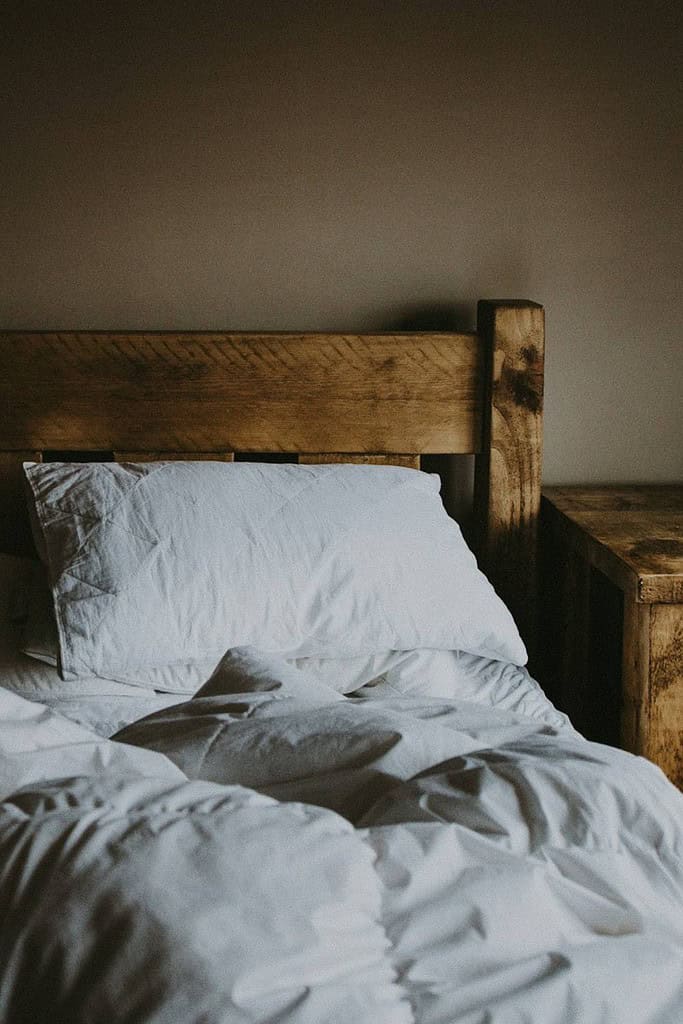
Whether you are a caregiver like me, or anyone else seeking quality sleep, designing a personalized and consistent bedtime routine is a key factor for restful sleep.
A night routine for quality sleep doesn’t have to be extravagant or take a long time. Developing a few strategic habits an hour or so before laying your head down on your pillow can help you fall asleep faster, and stay asleep.
Following a consistent night routine before bed is probably one of the healthiest things you can do for your overall health.
While many people focus on diet and exercise as the main factors for health, sleep often takes a backseat.
However, sleep is critical for mental health (including managing anxiety and depression), cognitive function (such as critical thinking), cardiovascular health, and metabolic health (impacting conditions like diabetes and obesity).
This article offers practical, easy-to-implement, strategies for designing a good bedtime routine for healthy sleep. From managing electronic devices to creating the perfect bedroom for rest, you will learn tips to help transform wakeful evenings into restful nights’ sleep and energized days.
This article may contain affiliate links for your convenience, and as an Amazon Associate, I earn from qualifying purchases at no extra cost to you. You can read the full disclosure policy here.
Thriving versus Surviving: Sleep Well or Sleep Deprived
Quality Sleep Benefits
Positive well-being. Getting enough sleep on a regular basis provides an overall sense of well-being, and waking up after a good night’s sleep is a great way to start the day, helping us feel more prepared to tackle whatever challenges lie ahead.
Improved coping skills. Sleeping well also sets a positive tone for the day and strengthens our coping skills, making daily tasks more manageable.
Cognitive benefits. Getting enough hours of sleep regularly is critical for both our mental and physical health. During sleep, our brain organizes and consolidates information, which enhances our ability to learn and remember new information that is coming in daily.
After a good night’s rest, we are better equipped to pay attention, make decisions, and recall information effectively.
Heal, strengthen, and repair. The physical benefits of adequate sleep are many. Sleep allows our body to heal and repair itself, promotes better hormone balance, supports healthy growth and development, and strengthens our immune system to fight off illnesses.
Disrupted Sleep Consequences
Poor sleep hygiene can have far-reaching consequences on our overall health. When we don’t get enough sleep, our whole body suffers.
Poor coping skills. Sleep deprivation makes it difficult to make decisions and weakens our coping skills.
Difficulty concentrating. We may experience daytime drowsiness, fatigue, poor concentration, and difficulty focusing.
Continued sleep problems. Inadequate sleep can also disrupt our circadian rhythm, including the crucial deep sleep portion of our sleep cycle.
Mental health issues. This disruption can lead to a vicious cycle of continued sleep problems, potentially exacerbating mental health issues such as anxiety and depression.
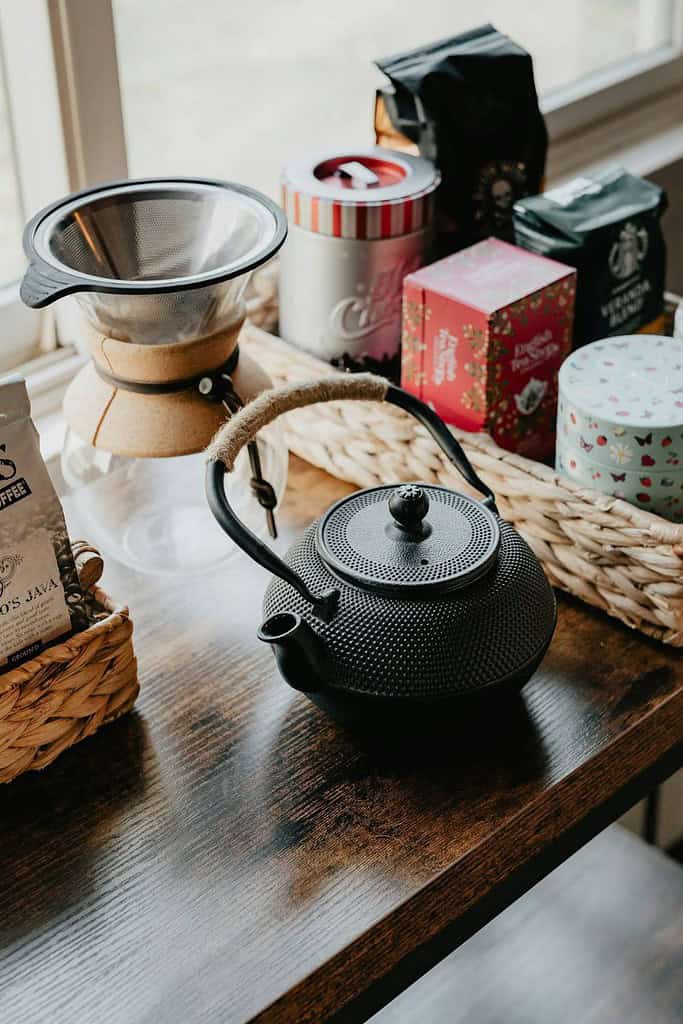
A Night Routine Foundation
Circadian Rhythm
Our bodies have a natural rhythm, called the circadian rhythm, which acts as our internal master clock. This rhythm controls our sleep/wake cycle, body temperature, and the production of melatonin, a hormone that aids in regulating our sleep patterns according to light and darkness.
Paying attention to this internal clock and listening to its cues can be very helpful in developing a consistent sleep schedule.
Night Routine Start Time
There is no specific time to start your night routine for everyone but a good rule of thumb is to begin winding down as the sun begins to set. This timing will vary depending on the season and time of year, allowing you to adjust according to your body’s natural rhythm.
At a minimum, your routine should begin about one hour before you plan to actually sleep, that is, one hour before your head hits the pillow.
Night Routine Location
The location where you start your night routine can vary depending on your activities. If you choose to take a warm shower or bath before bed, you will start in the bathroom. if you prefer to do some deep breathing exercises, then you might begin in your living room or bedroom.
Consistency is Key
Consistency is key when it comes to a sleep schedule. It is important to set and maintain a consistent bedtime, and waketime, every day including weekends and holidays.
There really isn’t such a thing as “catching up” on sleep. If you do get off schedule for some reason, aim to stay within about an hour of your regular bedtime and wake time.
Evening Preparation
Morning prep. In the evening, when you are starting to wind down your day, a great thing you can do is get organized and ready for the following day and your morning routine.
- Coffee/Tea prep. Prepare the coffee pot or ensure the tea kettle is filled with water and your cup is set out.
- Breakfast prep. Setting the breakfast dishes out for the morning, and any food prep you can do the night before.
- Clothes prep. Think about the clothes you are going to wear the following day, and set these clothes out so that when you awake in the morning, they are there for you ready to go.
- Kitchen prep. Dishes are all cleaned, dried, and put away. Food is covered and stored properly in the fridge, etc.
Reduce tasks. Start reducing tasks, especially the more demanding tasks. Leave those responsibilities for earlier in the day if possible.
Set stop time. Set a time to stop working on household chores, and allow your body and mind time to transition to a time of rest.
To-do list. Write down your to-do list for the following day. This helps clear the mind and reduce stress and anxiety.
Calm activities. In the evening engage in activities that bring you a sense of peace such as reading, journaling, or a hobby you enjoy.
Creating A Peaceful Sleep Environment
Your bedroom should be your haven for rest and sleep only, and there are steps you can take to make your bedroom the ultimate sleep-focused environment.
Dark. Aim to make your bedroom as dark as possible. Any light from various sources, such as an alarm clock, window, television, phone, etc. will slow down the production of melatonin, our sleep hormone, because our bodies are extremely light-sensitive.
If you cannot eliminate light in your bedroom, consider wearing a sleep mask. I have found these to be quite helpful, and not just for travel and plane rides.
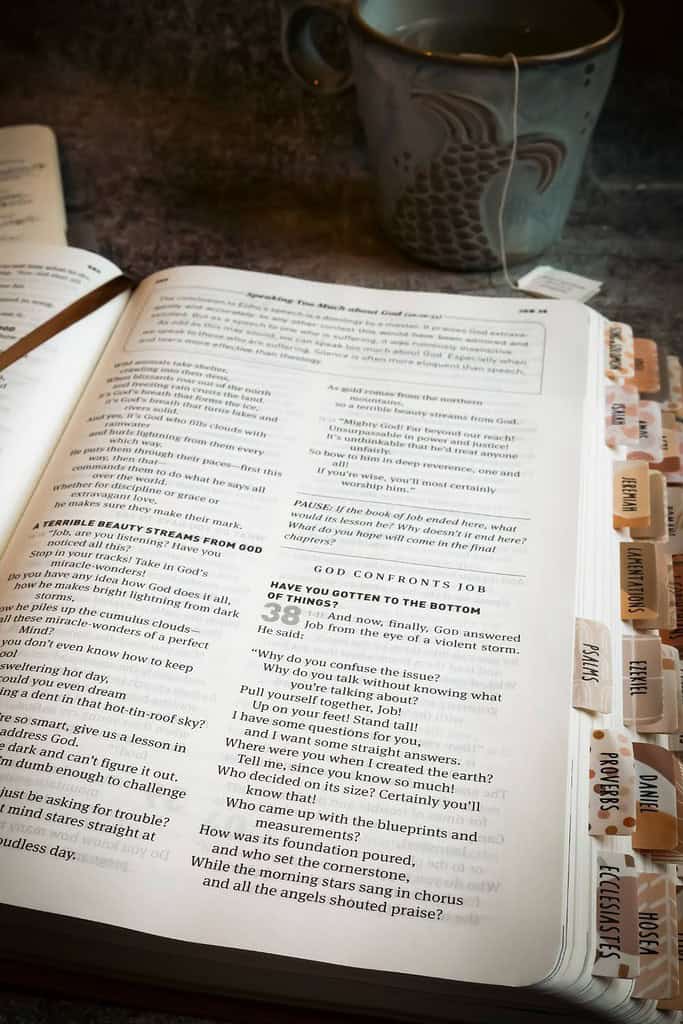
Cool. Research shows we sleep better in a cooler environment. Cool but not uncomfortable. Everyone is different, so you will need to experiment with this, but most adults are comfortable in a bedroom that runs approximately 65°-68° Fahrenheit.
Young children and the elderly may need their bedroom temperature slightly higher.
Quiet. For quality sleep, it is important to manage the noise environment in your bedroom. It is not so much about having zero noise as it is about limiting abrupt changes in noise volume.
One of the worst things we can do is sleep with our pets (sorry furry friends!). Their movement throughout the night can prevent us from getting into deep sleep, the most restful part of our sleep cycle.
Some people like complete silence, while others prefer background noise while sleeping. There are different types of ambient sound so if you feel you sleep better with background noise, experiment with the sound frequency that works best for you.
I find using a sunrise alarm clock very helpful. Not only does it help you wake up in the morning with light but it also avoids the blaring loud noise of a regular alarm clock that can abruptly bolt you awake in the morning – not the best way to start your day!
A sunrise alarm clock wakes you up calmly and slowly with the “sunlight” getting brighter and brighter. Similar to how your body would naturally wake in tune with its circadian rhythm.
Many sunrise alarm clocks also have the option for more gentle alarm sounds as well as a variety of ambient sounds you can use while sleeping.
Mattress. Having a quality mattress that suits your comfort level is extremely important. Think about it, we spend about one-third of our lives sleeping, so it is worth the investment!
Sheets/pillows. As with a mattress, having the type of sheets and pillows that aid in peaceful sleep is vital. Some people prefer a lightweight sheet, like silk, while others prefer cotton, linen, and more.
The style of the pillow makes a big difference as well. Whether you are a side sleeper, or sleep on your front or back, there is a pillow design that works best for your sleep position.
I sleep on my side and use the Malouf pillow. I find it very helpful in supporting my neck, and it contributes to me getting a good night’s sleep.
Using a weighted blanket can be helpful for some people. I bought one for Doug, who has Parkinson’s disease, and he said it felt good because it eased his tremors before falling asleep.
Sleepwear. The most important thing to think about when choosing sleepwear is that it is lightweight, breathable, and non-constraining. You don’t want your pj’s to be the thing that wakes you up in the middle of the night because they are either too warm, cold, or restricting.
Helpful Steps Leading Up To Sleep
Once you’ve created a peaceful sleep environment and started your evening preparation for sleep, it is time to focus on the pertinent steps leading up to laying your head down on the pillow and actually sleeping.
Here are some helpful steps for peaceful quality sleep.
Disconnect. At least one hour before lying down, disconnect from all gadgets and technology, including the television. The blue light emitted from electronics is very stimulating and slows down the process of your body making melatonin for sleep.
Melatonin is often called the sleep hormone and it influences our body’s circadian rhythm. Even just a small amount of light can disrupt a person’s circadian rhythm, melatonin production, and sleep.
Relaxation. Taking steps to relax in the evening can be very helpful. From a gentle stretching session to prayer or meditation, anything that will help your body and mind unwind.
Examples of relaxation techniques are breathwork, prayer, meditation, light reading, a warm bath, gentle stretching, and journaling.
Eating and Drinking Before Bed
Limiting food and drink right before bed can aid in getting a restful night’s sleep. Letting your body rest rather than work at digesting food while you are sleeping promotes a more peaceful slumber.
Avoiding caffeinated drinks and alcohol before bed is also helpful. Both caffeine and alcohol are stimulants and can disrupt sleep.
Personal Care Routine Before Sleep
When it comes to quality sleep, don’t skimp out on creating a routine for your personal hygiene and grooming habits.
Taking a warm shower or bath, or washing your face with a gentle cleanser and warm water, are self-care rituals that will calm and relax your body before bed.
Making time for a consistent personal care routine is a loving way to remind yourself that you matter, and it will help you drift off to sleep peacefully.
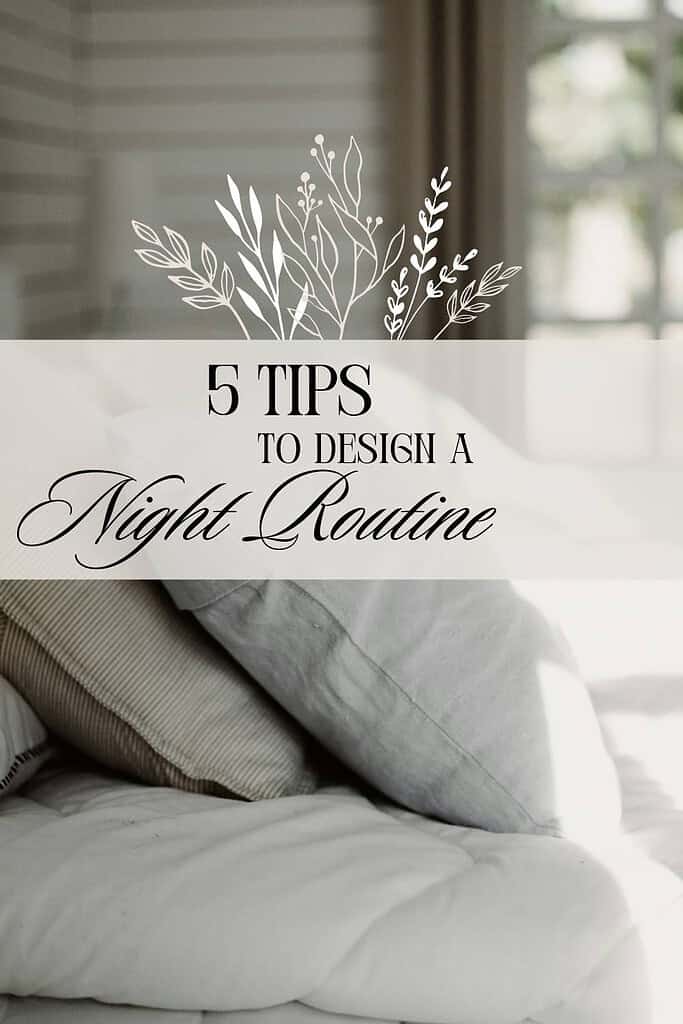
Special Considerations When Designing A Night Routine
Sleep Apnea
Sleep apnea is a sleep disorder where sleep becomes disrupted due to abnormal breathing. Common symptoms of sleep apnea are loud snoring, frequently waking up, gasping for air when sleeping, headaches, and being tired during the day.
If you have tried improving your sleep hygiene routine and are still experiencing disrupted sleep or any of these symptoms, it is important to talk to your doctor about the disruption, and perhaps even have a sleep study performed.
There are effective ways to treat sleep apnea including using a continuous positive airway pressure (CPAP) machine. Talking to your doctor or a sleep specialist can help.
Medications and Supplements
Sleep aids. Some people find sleep aids help them achieve better sleep, however, one needs to consider any kind of supplement carefully. Many sleep aids are not regulated and research can be limited. Always talk to your healthcare provider before taking any new supplement.
- Melatonin. Helps the brain prepare for sleep, and is often used when traveling to different time zones.
- Lavender. Often used as an essential oil in diffusers, on pillows, or bedsheets to help calm and relax.
- Magnesium. More research is needed but some studies show improvement in insomnia symptoms.
Sleep medication. A word of caution about sleep medication. Sleep medications are different than sleep aids and they contain ingredients that may cause serious side effects and conflict with other medications.
Sleep medications can be bought over the counter or prescribed by a doctor. However, if you are considering sleep medication, it is advised to strongly work at improving every aspect of your sleep hygiene routine first.
If you are still having sleep trouble, talk to your healthcare provider for guidance and direction. Do not jump directly to a sleeping pill.
5 Tips For Consistency
Now and again, no matter how consistent a sleep schedule is, one’s schedule can get disrupted. The important thing is to keep at it and remain as consistent as possible.
Here are five tips for staying consistent with a sleep schedule.
- Start small. If you feel that tackling everything all at once is too much, start small and pick only one or two things to work on. As you get the hang of those few things, add one or two more techniques to your sleep hygiene schedule.
- Remain flexible. It is unlikely that you will be able to do all of the tips and techniques every single night. Stay flexible and use the sleep tips that work for you with your time and energy.
- Reminders. If you find the evening gets away from you faster than you’d like, consider using reminders, either in the form of notes around the home or notifications on your phone, whatever will help you remember to start winding down.
- Backup plan. Take the time to create a couple of different sleep routines. That way if one isn’t working for you, or you aren’t in your own home and environment, then you have an alternative plan to work with.
- Compassion. Most importantly, have self-compassion for the work you are trying to do in designing a strong sleep schedule. Habits take time, and it is natural to fall back into old habits we are trying to change.
Sweet Dreams Ahead
Sleep is incredibly important for our overall health and well-being. Designing a night routine for better sleep will benefit you both immediately and in the long run.
If you feel your sleep schedule could use some improvement, I encourage you to incorporate a few of these tips and strategies into your sleep hygiene routine.
A good night’s sleep provides numerous benefits: Feeling well-rested and ready for whatever the day may bring, having the ability to concentrate and make decisions readily, and experiencing mental clarity.
Let us all aim for a good night’s sleep tonight. Sweet dreams!
More Well-Being Articles to Enjoy
- Heart Disease Risk and Caregiving: 10 Self Care Tips
- Sleep Deprivation Symptoms and Health Effects
- How To Use A Sauna: Health and Safety for Beginners
- 5 Simple Dumbbell Exercises: Full Body Beginner Workout
Additional Support for Caregivers
Let’s Connect
I hope you found this article on how to design a night routine for better sleep helpful
Sleep is the foundation for how we build healthy and productive days in our lives. When we take the time to design a personalized nighttime routine for improving sleep, we not only sleep better but also generally improve the quality of our lives.
QUESTION: What are some of your sleep strategies, and how do you personally stay consistent with sleep?
Let me know in the comment section below, I would love to hear from you.
Also, please consider sharing this article with friends and family, or anyone you feel would find it beneficial.



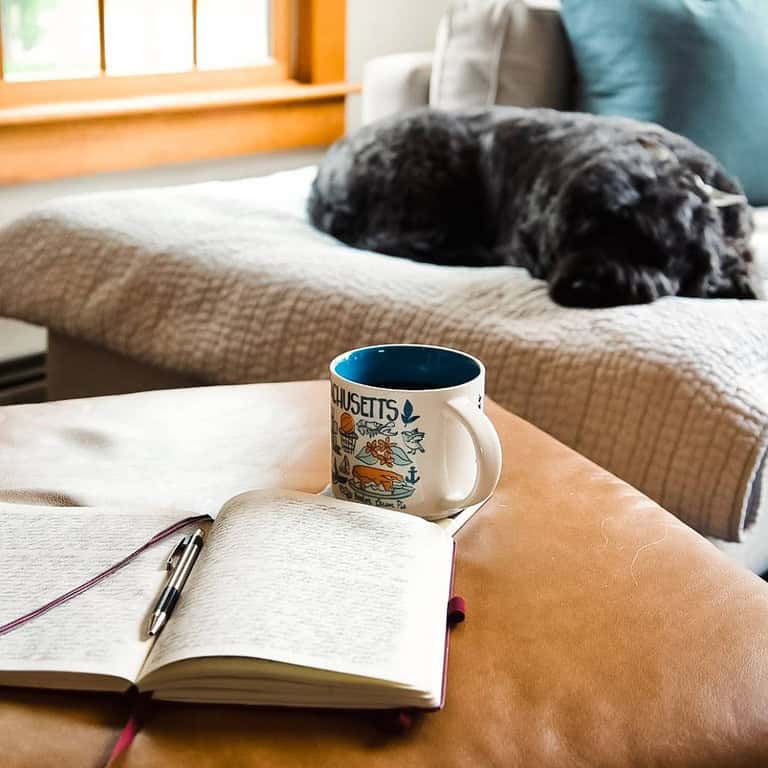



Wow! What an in depth article with such amazing tips for sleeping. Thanks so much for compiling this great information! So helpful
Awhhh you are most welcome. Glad you found it helpful!
Great reminders and tips!
Thank you Ashleigh.
Great tips ! Thanks so much for this !
You are most welcome. Thank you for your support!
Such a thorough post and so helpful! I will be implementing several new things to my bedtime routine.
Oh I’m so glad you found it helpful, thank you for your support!
Perfect timing! Loved all your great tips!
Oh good, glad you liked it. Thank you for your support!
Very comprehensive strategies, I will be implementing these!
Nice! Thank you for your support.
This is such a great post. It’s funny, I have my morning routine but not so much a night routine. I may have to rethink that. Lol thank you for sharing your tips, they are great!
Ohhh nice! It’s great that you have your morning routine. Add a personalized night routine and you have the perfect bookends to your day! 😉 Thank you for your support!